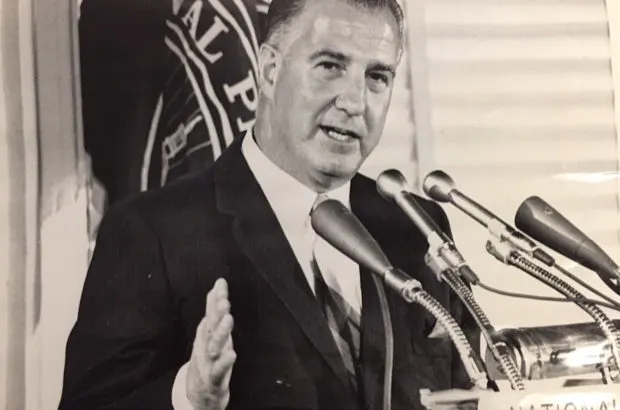A phrase used by Vice President Spiro Agnew to refer to the members of the media with whom he had a very acrimonious relationship.
The phrase was first used by Agnew in a speech on September 25, 1970 in which he slammed the media for negative coverage of the Nixon administration.
Said Agnew: “In the United States today, we have more than our share of the nattering nabobs of negativism. They have formed their own 4-H Club — the ‘hopeless, hysterical hypochondriacs of history.'”
The phrase was intended to mock journalists, by suggesting that they were petty and insignificant.
Deployed at a time of turbulent anti-Vietnam War sentiment and increased scrutiny of the Nixon administration, Agnew’s pointed phrase was aimed at journalists who he accused of undermining American values.

Origin of “Nattering Nabobs of Negativism”
The phrase was widely reported in the media at the time, and it has since become a popular phrase used to refer to people who are excessively negative or critical.
While “nattering nabobs of negativism” is generally attributed to Agnew, it was actually written by White House speechwriter William Safire.
As Will Bunch explained:
The words that William Safire penned and that Spiro Agnew mouthed actually had enormous impact that has lasted until this day. They helped foster among conservatives and the folks that Nixon called ‘the silent majority‘ a growing mistrust of the mainstream media, a mistrust that grew over two generations into a form of hatred.
It also started a dangerous spiral of events — journalists started bending backwards to kowtow to their conservative critics, beginning in the time of Reagan, an ill-advised shift that did not win back a single reader or viewer on the right. Instead, it caused a lot of folks on the left and even the center to wonder why the national media had stopped doing its job, stopped questioning authority.
Safire’s choice of alliteration and near-rhyme in “nattering nabobs of negativism” made it a catchy and memorable phrase, ensuring its place in the annals of American political rhetoric.
Historical context of the phrase
Agnew’s speech was part of a broader strategy by the Nixon administration to counter growing public discontent over the Vietnam War and other societal issues, as well as to undermine faith in the mainstream media—an institution that the administration viewed as inherently hostile.
This tactic, which came to be known as the “Southern Strategy,” also aimed at galvanizing conservative support, particularly among white Southern voters, by appealing to traditional values and criticizing liberal elites, epitomized by the media and intellectuals.
Even if the original context is forgotten—a vice president’s speech attacking press criticism during a deeply divisive war—the words continue to resonate as an encapsulation of the tensions between politicians and a skeptical press corps.
It’s a piece of political folklore, so to speak, that political junkies still discuss to dissect its myriad implications for governance and public discourse.
Another very memorable line coined by Agnew was his calling anti-Vietnam war protesters “effete snobs.”
Use of “Nattering Nabobs of Negativism” in a sentence:
- The nattering nabobs of negativism are always quick to criticize, but never offer any solutions to the problems they complain about.
- Despite the constant nattering of the nabobs of negativism, we remain committed to our vision for a better future.
- The nattering nabobs of negativism may try to bring us down, but we will not be deterred from pursuing our goals.